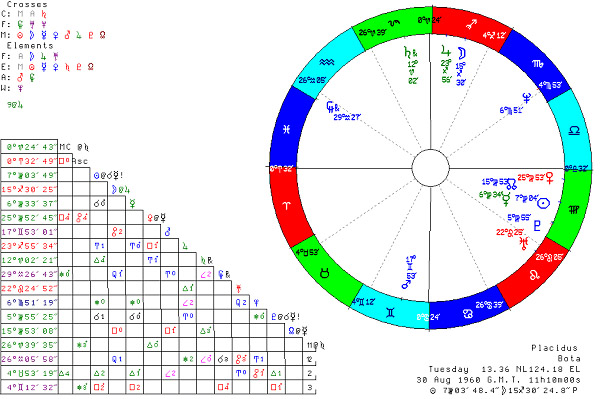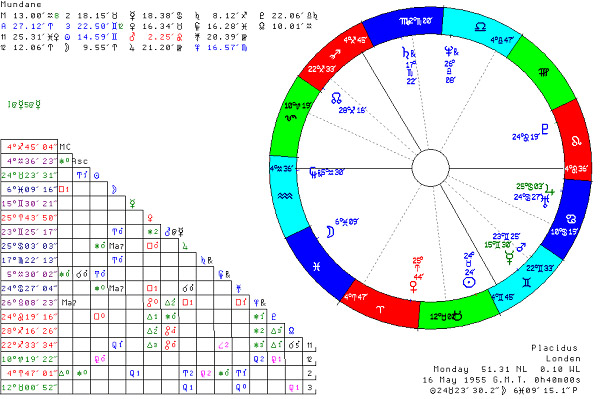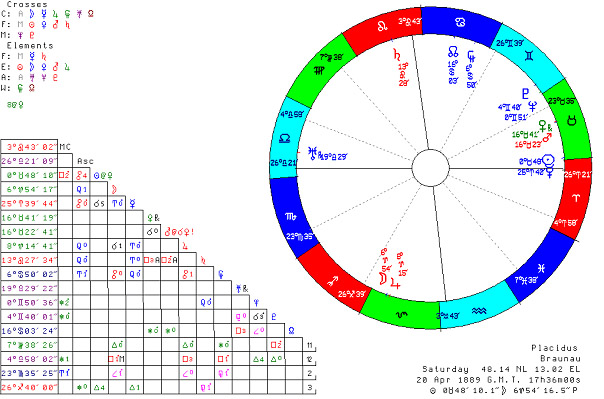
|
THE RULARSHIP CONJUNCTION
Copyright © 2007 All Rights Reserved by Wim van Dam In the 21st book of his Astrologia Gallica, Morin stresses passim that a planet that is not positioned in his own sign should be considered to be conjunct to the ruler of this sign.
Most astrologers do not pay much value to the above rule if they know it at all. Personally, I think it is too rigid a rule. I suppose it is significant especially if the planet and its ruler make an outspoken positive or negative combination, f.e. Saturn in Cancer or in Leo. A conjunction of Saturn and the moon in Cancer or of Saturn and the sun in Leo is not exactly what we astrologers are longing for in a horoscope. I therefore want to introduce a rule that can be considered somewhat sharpened but more easily applicable variant on Morin's rule: whenever a planet is positioned in a sign that it rules, any other planet or cusp that is positioned in this same sign can be considered to be conjunct with that ruler, irrespective of the distance in degrees between this planet/cusp and its ruler. So we reduce Morin's rule to those cases where the ruling planet stands anywhere in the same, its own, sign. I call this the rulership conjunction. In my PC-program Morinus 2000, I indicate such a rulership conjunction by an @ with the glyph of the ruling planet next to the aspectarium. If the orb is small enough for a regular conjunction too, this is indicated by an @ with an exclamation mark: @! More than one example of this technique is provided by the horoscope of Fei Cochrane, President of Cosmic Patterns Software:  Here we see (#1) Jupiter in nine in its own sign, together with the moon and the cusp of the ninth house. This means that in Fei's chart, she has a virtual conjunction of Jupiter, the moon and cusp nine in Sagittarius, which is certainly applicable for a Philippine woman who emigrated to the U.S.A., married her employer and has been the organising power behind Cosmic Patterns Software for 17 years now. The Moon-Jupiter conjunction is indicated in green, since Jupiter is a benefic. Her Saturn in ten in Capricorn, in rulership conjunct to the MC in Capricorn (#2), indicates she reached this position by her earnest and ambitious character and longed for it from her youngest days. Marrying her employer is reflected by Mercury in Virgo in six (all indicative for work), in rulership conjunction #3 with Venus and the sun. Venus needs no explanation, the sun is a strong indicator of the husband in any woman's horoscope but the more so here since the descendant is in a critical degree ruled by the sun. Note that the Node too is in rulership conjunction with Mercury, most applicable if like me you defend the Node, the crossing point of the sun's and the moon's paths, as the natural point of union of man and woman. Also note that the Node is not only in rulership conjunction with Mercury but also in Mercury's degree of exaltation, thus intensifying their link. The sun-Mercury conjunction in six, indicating her marriage to her employer, is linked to Jupiter in Sagittarius in nine (thrice abroad) through a tredecile (108 degrees). There also is a square between Venus in six to this same Jupiter but a square with Jupiter in Sagittarius is about the last thing one should fear in a horoscope. Our next example is John Frawley's horoscope:  On the above chart, we see both Mars (on cusp five) and Mercury in four in Gemini, Mercury's sign. John Frawley of course is a very good example of a talented author (Mercury in its own sign Gemini) who writes with aggressive wit (Mars in same sign) and ostensibly likes doing so (five). According to the rule, he has Mars and Mercury conjunct on cusp five in Gemini. Such an outspoken trait cannot be sufficiently explained by supposing that in this horoscope Mercury and Mars, with a distance of eight degrees, are in a regular conjunction: they are in rulership conjunction. We leave it to the reader, just how harmonious this conjunction is. We will now use Hitler's horoscope as our last example:  Here we see Mars in a rulership conjunction with Venus while it is also in a regular conjunction with that planet indicated with an exclamation point. It is a conjunction between two planets that are each other's opposite and Mars is a malefic too. This is a very bad indication and for that reason, it is indicated in red. A conjunction between Saturn and Venus in Libra would be drawn in green, since it would be Venus' sign (a benefic) and Saturn's exaltation sign. Far better is the rulership conjunction between Venus and the sun. The sun is ruler of ten and we may suppose that this was one indication that helped Hitler seize the power - although with a fatal ending since Venus is so badly positioned. In addition to Mars and the Sun, another point is in rulership conjunction with Venus. This is a very good illustration of the value of the rulership conjunction and a worthy observation to finish this article with:
Now, at first sight we might be satisfied with this indication and conclude that the concept of the rulership conjunction compensates for a non-existing conjunction where necessary, and that's it. Thank you very much. There is one last observation to be made however: Mars and Venus are still conjunct in the seventh house although, as we now know, with lethal load. If we take in consideration that Venus is not only the ruler of one and eight but also natural ruler of seven and that Mars is the actual ruler of seven, both being fatally conjunct by rulership to cusp eight, then we see that in this horoscope marriage and a violent death are inextricably linked. It is a most perplexing indication of the fact that Hitler just before his suicide married Eva Braun and that he took her with himself into death. He could not commit suicide before marrying her and he could not marry her before having decided on his suicide. I hope these three example horoscopes have convinced the reader that the idea of the rulership conjunction is worthwhile testing. It is a simple and elegant rule and can easily be tested in almost every horoscope.
|

 AUTHOR:
AUTHOR: 